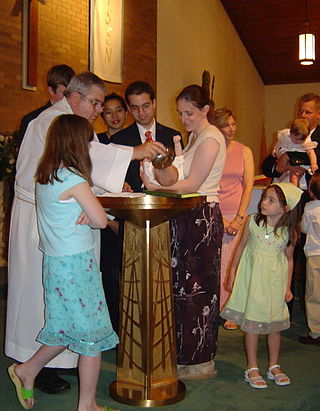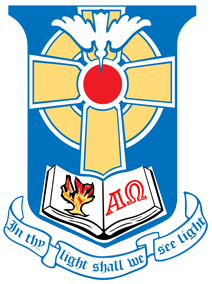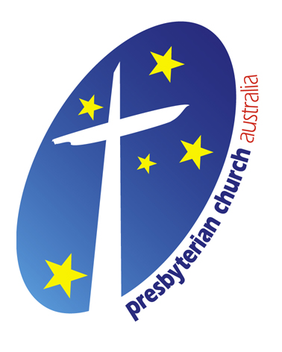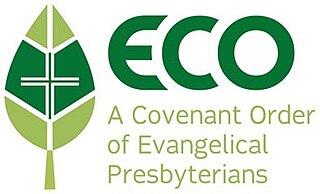
Infant baptism is the practice of baptizing infants or young children. Infant baptism is also called christening by some faith traditions.

The Presbyterian Church (USA), abbreviated PCUSA, is a mainline Protestant denomination in the United States. It is the largest Presbyterian denomination in the country, known for its liberal stance on doctrine and its ordaining of women and members of the LGBT community as elders and ministers. The Presbyterian Church (USA) was established with the 1983 merger of the Presbyterian Church in the United States, whose churches were located in the Southern and border states, with the United Presbyterian Church in the United States of America, whose congregations could be found in every state.

Messianic Judaism is a syncretic Abrahamist new religious movement or sect that considers itself Jewish. Many Jews and Jewish authority figures, both in the United States and Israel, consider it a part of Evangelical Christianity.
The Dabru Emet is a document concerning the relationship between Christianity and Judaism. It was signed by over 220 rabbis and intellectuals from all branches of Judaism, as individuals and not as representing any organisation or stream of Judaism.

The Church of Scotland is a Presbyterian denomination of Christianity that holds the status of the national church in Scotland. It is one of the country's largest, having 259,200 members in 2023. While active membership in the church has declined significantly in recent decades, the government Scottish Household Survey found that 20% of the Scottish population, or over one million people, identified the Church of Scotland as their religious identity in 2019. The Church of Scotland's governing system is presbyterian in its approach, therefore, no one individual or group within the church has more or less influence over church matters. There is no one person who acts as the head of faith, as the church believes that role is the "Lord God's". As a proper noun, the Kirk is an informal name for the Church of Scotland used in the media and by the church itself.

The Presbyterian Church in America (PCA) is the second-largest Presbyterian church body, behind the Presbyterian Church (USA), and the largest conservative Calvinist denomination in the United States. The PCA is Reformed in theology and presbyterian in government.

The Westminster Confession of Faith, or simply the Westminster Confession, is a Reformed confession of faith. Drawn up by the 1646 Westminster Assembly as part of the Westminster Standards to be a confession of the Church of England, it became and remains the "subordinate standard" of doctrine in the Church of Scotland and has been influential within Presbyterian churches worldwide.
The Orthodox Presbyterian Church (OPC) is a confessional Presbyterian denomination located primarily in the United States, with additional congregations in Canada, Bermuda, and Puerto Rico. It was founded by conservative members of the Presbyterian Church in the United States of America (PCUSA), who objected to the rise of Liberal and Modernist theology in the 1930s. The OPC is considered to have had an influence on evangelicalism far beyond its size.

The Associate Reformed Presbyterian Church (ARPC) is a theologically conservative denomination in North America. The ARPC was formed by the merger of the Associate Presbytery (seceder) with the Reformed Presbytery (covenanter) in 1782. It is one of the oldest conservative denominations in the United States.

Covenant theology is a Biblical Theology, a conceptual overview and interpretive framework for understanding the overall structure of the Bible. It is often distinguished from dispensational theology, a competing form of biblical theology. It uses the theological concept of a covenant as an organizing principle for Christian theology. The standard form of covenant theology views the history of God's dealings with mankind, from Creation to Fall to Redemption to Consummation, under the framework of three overarching theological covenants: those of redemption, of works, and of grace.

The Presbyterian Church of Australia (PCA), founded in 1901, is the largest Presbyterian denomination in Australia. The larger Uniting Church in Australia incorporated about 70% of the PCA in 1977.
The Divine Service is a title given to the Eucharistic liturgy as used in the various Lutheran churches. It has its roots in the Pre-Tridentine Mass as revised by Martin Luther in his Formula missae of 1523 and his Deutsche Messe of 1526. It was further developed through the Kirchenordnungen of the sixteenth and seventeenth centuries that followed in Luther's tradition.

The National Presbyterian Church is a Christian congregation of approximately 1,500 members of all ages from the greater metropolitan Washington, D.C. area. The mission statement of the church is "Leading People to Become Faithful Followers of Jesus Christ Together in God's World"

The Reformed Presbyterian Church of North America (RPCNA) is a Presbyterian church with congregations and missions throughout the United States, Japan, and Chile. Its beliefs—held in common with other members of the Reformed Presbyterian Global Alliance—place it in the conservative wing of the Reformed family of Protestant churches. Below the Bible—which is held as divinely inspired and without error—the church is committed to several "subordinate standards," together considered with its constitution: the Westminster Confession of Faith and Larger and Shorter Catechisms, along with its Testimony, Directory for Church Government, the Book of Discipline, and Directory for Worship.
Relations between Protestantism and Judaism have existed since the time of the Reformation, although there has been more emphasis on dialogue since the 20th century, with Protestant and Jewish scholars in the United States being at the forefront of the emerging interfaith movement.
In religion, a covenant is a formal alliance or agreement made by God with a religious community or with humanity in general. The concept, central to the Abrahamic religions, is derived from the biblical covenants, notably from the Abrahamic covenant. Christianity asserts that God made an additional covenant through Jesus Christ, called the "new covenant".

Sabbatarianism advocates the observation of the Sabbath in Christianity, in keeping with the Ten Commandments.

ECO: A Covenant Order of Evangelical Presbyterians is an evangelical Presbyterian denomination in the United States. As a Presbyterian church, ECO adheres to Reformed theology and Presbyterian polity. It was established in 2012 by former congregations and members of the Presbyterian Church (USA), abbreviated PC(USA). Denominational disputes over theology—particularly ordination of practicing homosexuals as pastors and gay marriage—and bureaucracy led to the founding of ECO. In 2018, ECO has over 383 congregations, 103,425 covenant partners and over 500 pastors. ECO churches are egalitarian in beliefs and ordain women as pastors and elders.
The Brief Statement of Faith is a statement of faith adopted by the Presbyterian Church (USA) in 1991 as part of its Book of Confessions.

Church membership, in Christianity, is the state of belonging to a local church congregation, which in most cases, simultaneously makes one a member of a Christian denomination and the universal Christian Church. Christian theologians have taught that church membership is commanded in the Bible. The process of becoming a church member varies based on the Christian denomination. Those preparing to become full members of a church are known variously as catechumens, candidates or probationers depending on the Christian denomination and the sacramental status of the individual.















